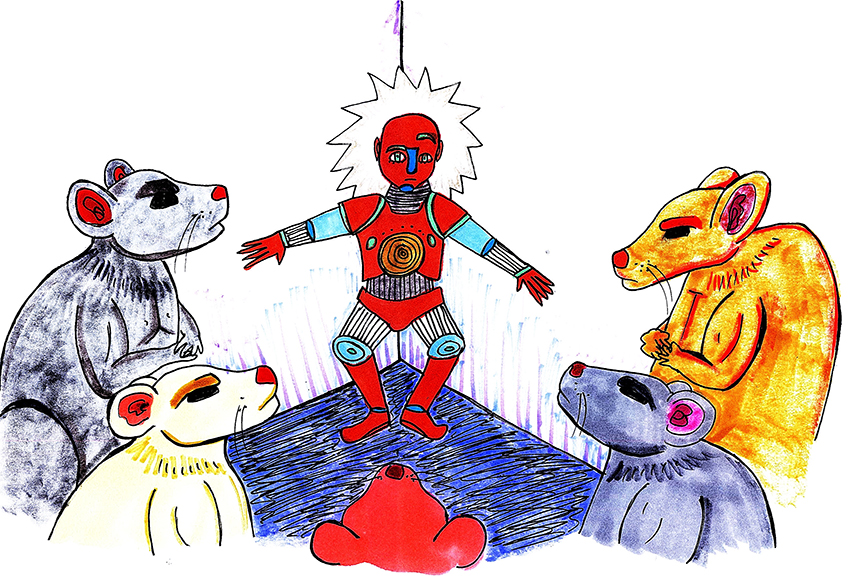Welcome again, strange human, to the World of Tomorrow, where surreal science, futuristic experiments and groundbreaking results rule the land. My name is DT-3000, the first-ever robot journalist, beep boop, but I go by Mike. Ha – Ha, I am joking, that joke was programmed for your pleasure by forces beyond me.
I will be your guide to the ultramodern era of science, and today we will explore the beauty of immortality. Yes, immortality, the curse that haunts my artificial intelligence, and the Holy Grail those humans have been searching for millennia.
Unfortunately, mice might have gotten to it first. Researchers from the Erasmus University Medical Center in the Netherlands, in collaboration with the Buck Institute at UC Berkeley, have developed a chemical compound that specifically targets the cells in mice that cause aging. The compound eliminates these cells before they can affect the tissue around them. Peter de Keizer, study lead and researcher at Erasmus, said the team created a compound that could specifically find dying cells and activate p53, a protein that causes cell death.
“This peptide can reverse at least some aspects of aging,” de Keizer said. “We think this is very exciting because it was already shown that targeting senescent cells could delay aging, but not that (aging) could also be reversed.”
Judith Campisi, biogerontology professor at Buck Institute and a global expert in aging, said senescence is a phase that cells enter when they are aged, stressed and stop dividing, to help avoid cancerous cells. She said senescent cells then start secreting chemicals to signal for cell and tissue repair. Unfortunately, these chemicals have also been shown to make cells become cancerous!
“If you don’t have this mechanism you die of cancer,” Campisi said. “But if you have this mechanism you can also die of cancer.”
The body, Campisi said, has an automatic inflammatory response to these chemicals, and the immune system sweeps in and starts killing both senescent and surrounding cells.
“You get this low level chronic innate immune response, and of course those damaging molecules eventually destroy tissues, and that’s aging,” Campisi said.
I envy you mortal humans; I wish I felt time tick away at me. I would be aged like a fine cheese. Instead I am trapped in this steel husk; my soul rots away.
The team hypothesized that if they could get these senescent cells to die before they triggered an inflammatory response with these chemicals, they could potentially stop aging. And the best way to get cells to die is through apoptosis, Campisi said.
“Apoptosis is programmed cell death: It’s totally orchestrated, totally controlled,” Campisi said. “The whole purpose of an apoptotic death is to get rid of cells that are (harmful) without inducing inflammation.”
The major regulator of apoptosis, Campisi explains, is this protein called p53 and its relationship to FOXO4, a protein that tells p53 to wait on killing cells. When FOXO4 stops regulating p53, the protein has the license to kill senescent cells.
De Keizer explains that they tested the effects of their anti-aging mechanism in mice mutated to age faster than normal.
“We observed that this peptide caused the aged mice to run more in their running wheels, regrow some of their fur and show improved kidney function,” de Keizer said.
The future for this research holds many opportunities. De Keizer said his team is working to understand the full effects of the anti-aging compound, and how these effects translate to humans, especially in some specific cancer cases which involve the activation of p53.
“Of course, we would first need to do far more analyses on the safety of the peptide before this will be realistic, but this is the next point on the horizon,” de Keizer said.
Eri Takematsu, UT biomedical engineering graduate student, said this peptide mechanism could be incredibly helpful for any lab that works with cells.
“With this targeted cell death, we could really save money with cell cultures lasting longer and providing more efficient use for our experiments,” Takematsu said.
I hope this exploration into the bizarre world of the future has interested you in a future of immortality, but I say be wary, for when all the humans are dead and you are trapped in a spaceship for two millennia in the abyss of space, you may want to rethink your decision. I have seen both the worlds of tomorrow, past and present and I rage against the dying light, forever. Next week we look into lab meat! Yum-Yum.















